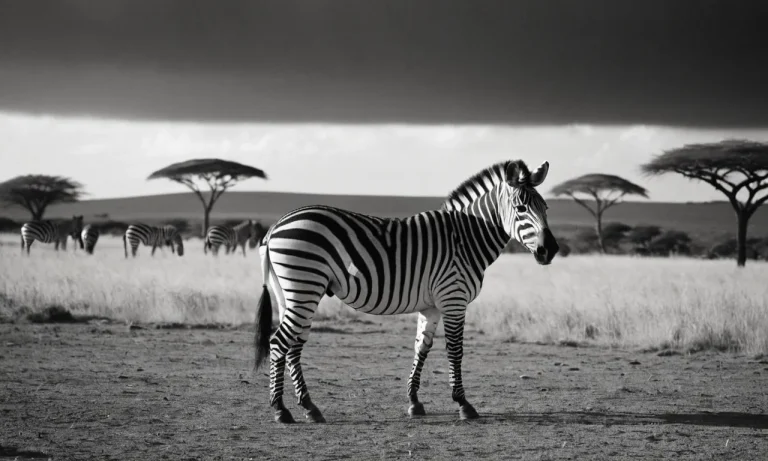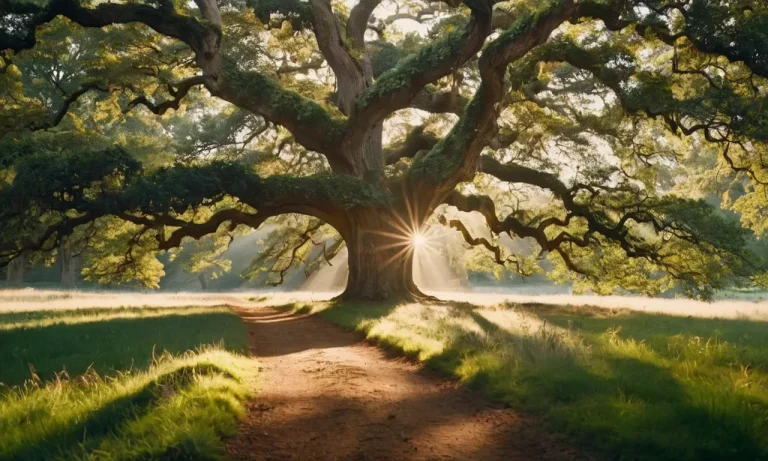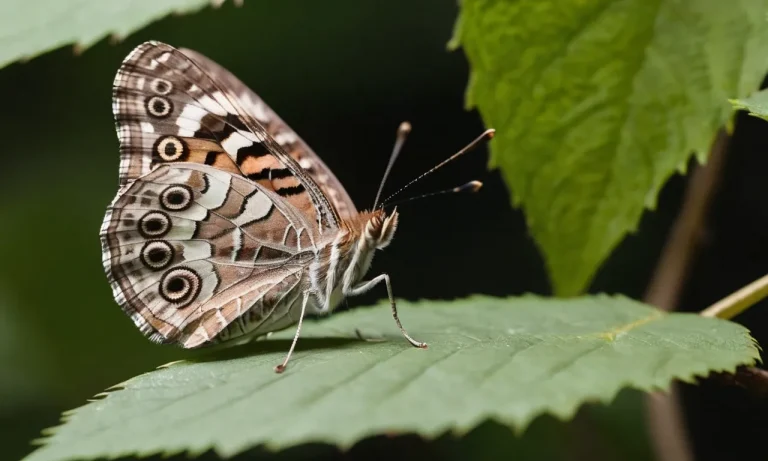Hornets have long captured people’s attention and imagination, not just because of their powerful sting, but also for the symbolic meaning people have attached to them throughout history. Cultures around the world have viewed hornets as symbols of things like leadership, order, regeneration, boldness, productivity, and more.
If you’re short on time, here’s the essence of the spiritual meaning of hornets: Hornets symbolize order, leadership, regeneration, productivity, defense, and boldness. They represent teamwork, communal responsibility, and the power of coordinated action.
The Basic Symbolic Meanings of Hornets
Order and Leadership
Hornets symbolize order and leadership in several ways. As social insects that live in well-organized colonies with clear hierarchies, hornets represent an orderly society working together efficiently towards common goals.
The queen hornet exemplifies strong leadership as she builds a nest, lays eggs, and directs the other hornets to gather resources. This demonstrates how good leadership and cooperation leads to productivity.
Productivity
The productivity of hornet colonies also lends them a symbolic meaning of hard work and diligence. Each hornet has a clear role ranging from guarding the nest to gathering wood and water. Their persistence in carrying out these duties with great energy reflects their symbolic link to staying focused on the task at hand.
According to one source, a single hornet colony can build up to seven nests in one season – evidence of their non-stop productivity.
Regeneration and Transition
Hornets abandon their perfectly constructed nests at the end of each season, leaving behind hollow shells. This cyclical regeneration of building new nests every spring symbolizes rebirth, renewal, and new beginnings.
Just as hornets transition yearly from old nests to new ones, they remind us that we too can leave behind what no longer serves us and start fresh in order to reach our fullest potential.
Defense and Protection
With their powerful stingers, hornets fiercely defend their nests against intruders, making them symbols of defense and protection. According to PestWorld, hornet venom is five times more toxic than wasp or bee venom.
So despite their smaller size, hornets pack a potent punch in protecting their colonies. Their bravery facing creatures much larger than themselves also represents the strength and determination found in small packages.
Facing difficult odds head on with courage and vigor reflects the spiritual warrior within.
Hornets as Symbols in Religion and Mythology
Hornets in the Bible and Christianity
In the Bible, hornets are mentioned as instruments of divine judgement and punishment. Exodus 23:28 states that God will send hornets ahead of the Israelites to drive out their enemies from the land of Canaan. This associates hornets with divine power and authority.
Some biblical scholars interpret the hornets metaphorically, representing fear and panic that demoralized the Canaanites. Others believe they were literal swarms of stinging insects. Regardless, hornets symbolize God mobilizing forces of nature to fulfill His will in the conquest narratives.
In Christian art and literature, hornets’ painful stings have represented sins, vices, death, and the Devil. Saints were depicted surviving being stung by hornets without harm, symbolizing resisting temptation and achieving incorruptibility.
The Oneiroi and Vespa Crabro in Ancient Greece
In Greek mythology, the Oneiroi were dark-winged spirits and sons of Nyx (Night) who entered dreams in the form of beasts like hornets to insert visions and prophecies. Therefore, hornets symbolized the dream world bridging mortal spirits and divine realms.
Specifically, the largest European hornet, Vespa crabro, was associated with dreams, spirits, and omens in Ancient Greece. Its loud buzzing reputedly announced important news, either boons or ill fortunes.
The Oneiroi and Vespa crabro link hornets to prophecy, visions, dream symbols, and belief in invisible spirits as intermediaries between worlds in Greek folklore and mythology.
Hornets in Egyptian and African Myths
In Egyptian mythology, the goddess Neith represented war and hunting prowess. Her priestesses were called the “hornets of Neith”. They served as protectors and warriors, symbolically stinging those who threatened order and justice in society.
Similarly, hornets feature in tales from Buganda (Uganda) as dangerous creatures, but also symbols of divine judgement against wrongdoers. They attack and sting those with wickedness in their hearts.
Across North Africa, indigenous folk religion depicts hornets as enforcing moral codes. For example, Akan traditions in Ghana tell of forest hornets attacking people disrespecting sacred sites. Therefore, hornets embody both retribution and sanctity in African mythology.
Cultural Perceptions of Hornets in History and Literature
The Power of the Hornet State in Feudal Japan
In feudal Japan, hornets were respected and even feared for their aggressive nature and painful sting. The wasp-like insects were seen as symbols of military might, inspiring fierce samurai warrior clans like the Hōjō to adopt hive and nest motifs for their family crests.
The Hōjō clan’s symbol was called the “Hornet’s Nest” crest, featuring three golden hornet nests shaped like Shinto shrines. This iconic heraldry symbolized the decentralised yet cooperative nature of the Hōjō army that swarmed enemies.
Just like hornet workers collectively defending their nest, Hōjō warriors fought in a well-coordinated, relentless manner that overwhelmed more powerful foes.
Literary References to Wasps and Hornets
In literature, wasps and hornets are often portrayed as angry, spiteful creatures associated with painful stings and intimidation. For example, in Dante’s Inferno, hornets are seen as instruments of torture in the third ring of Hell where sinners are subjected to endless hornet attacks as punishment.
Similarly, in Shakespeare’s Henry VI, a hornet’s sting is used as a metaphor for deception and betrayal, with the scheming Bishop Winchester vowing to make England “sting and swell”with turmoil during wartime much like a hornet inflicts a painfully inflamed wound.
However, some writers portray wasps more positively, highlighting the communal aspects of wasp colonies. In T.H White’s The Once and Future King, a young King Arthur transforms into a wasp to experience their highly social, hierarchical society as an allegory for human monarchies and civilisation.
The Legacy and Lessons of the Hornet Spirit
Communal Responsibility and Coordinated Action
Hornets provide an excellent example of communal living and coordinated action for the greater good. A single hornet cannot build an intricate paper nest or defend itself from predators, but together an entire colony works seamlessly to create a home, raise offspring, gather food, and protect the community (their power lies in unity).
There are important spiritual lessons we can learn from the selfless cooperation exhibited by hornets. Each insect plays a vital role by contributing its talents and fulfilling duties aligned to support shared goals and ensure survival.
Just as hornets divide labor – building, guarding, parenting – humans also thrive when leveraging collective strengths. We must uplift each voice and value diverse views to progress society.
The Dual Nature of Hornets
The hornet spirit represents the duality found throughout nature – destructive yet vital to ecological balance. With their painful stings, hornets can certainly inflict harm. However, these fascinating creatures also control pest populations and pollinate plants.
We may be inclined to see hornets solely as pests, but a deeper look reveals they too have purpose on this shared planet.
Moreover, hornets fiercely protect their homes when threatened – behavior driven by maternal instincts rather than malice towards outsiders. This reminds us that quick judgments rarely capture the full story.
Approaching the hornet spirit with an open and curious mind unveils lessons about respecting all life’s interconnected roles.
Reclaiming Reverence for Hornets
Modern society has unfortunately lost an appreciation for the miracle of the hornet (we fear their sting yet benefit from their existence). However, various Indigenous cultures and spiritual traditions have long viewed the hornet as a guide offering wisdom.
By observing hornet behaviors – their architectural expertise, valor in defending kin, dedication to service – perhaps we too can reclaim a reverence for these creatures and stand humbled by nature’s boundless ingenuity.
Each being, no matter how small or intimidating, has a rightful place on this shared Earth. The next time we encounter hornets may we see past our fears to find the stirring lessons within.
Conclusion
Throughout history and across cultures, hornets have acquired rich symbolic meaning representing concepts like leadership, regeneration, productivity, and defense. They exemplify the power of focused, coordinated effort and working toward a common purpose.
While their sting ensures they are both respected and feared, seeing hornets as spiritual symbols can help us appreciate important life lessons around community, transitions, boldness, the cycles of life and nature, and more.
Understanding the deeper meaning behind hornets allows us to revere them for their spiritual wisdom as much as their formidable nests.






